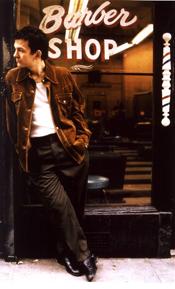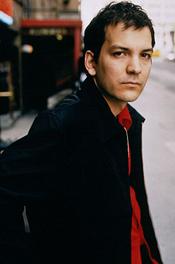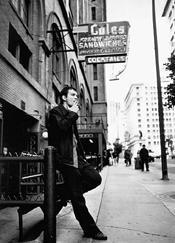 by Andrew Clevenger
by Andrew Clevenger
"Do you know who Isaiah Berlin is?" pianist Brad Mehldau asks toward the end of our recent conversation. "Uh, yeah," I fib, quickly scanning the "Authors I Read in College" file in my brain and coming up empty. He is, Mehldau patiently explains, the British philosopher and essayist who put intellectual and artistic personalities into two distinct categories: hedgehogs and foxes. Hedgehogs are the kind that hunker down and explore one thing at great length, while foxes roam around, sniffing at this and that, covering as much territory as possible. "I guess I'm more of a hedgehog," he concludes.
Strange as it may sound, this is an apt description of Mehldau's pursuits as a musician. His most recent album, "Art of the Trio 4: Back at the Vanguard" (Warner Bros.), is the latest installment in a series of recordings he has made with bassist Larry Grenadier and drummer Jorge Rossy. The result of this lineup constancy—a relative rarity in the world of jazz, where groups are often assembled for one or two sessions and then dispersed—is that listeners can chart not only Mehldau's growth as an artist, but also the interplay between three independent musicians.
Vol. 4 showcases the trio's fluidity and versatility. Rossy paints with a variety of drum strokes: daubing at the ride cymbal, splattering with the snare, blotting with the bass drum. Grenadier's basslines are irregular and surprising, constantly pushing the beat ahead, but never in the expected direction. As a soloist, Mehldau makes the most of this fertile foundation. "Solar," a Miles Davis composition, highlights Mehldau's ambidextrous technique: The boogie-woogie style of his left hand converses with the extended bebop runs of his right.
 Radiohead's "Exit Music (For a Film)" becomes a meditative exercise in introspection, with a plaintive single-note line gradually giving way to a cascade of tones. On a dizzying, up-tempo 7/8 "All the Things You Are," he swoops and stumbles, returning again and again to fragments of Jerome Kern's lovely melody, each time infusing it with grace and spontaneity.
Radiohead's "Exit Music (For a Film)" becomes a meditative exercise in introspection, with a plaintive single-note line gradually giving way to a cascade of tones. On a dizzying, up-tempo 7/8 "All the Things You Are," he swoops and stumbles, returning again and again to fragments of Jerome Kern's lovely melody, each time infusing it with grace and spontaneity.
This is another facet of Mehldau's "hedgehog-esque" artistic temperament. On a micro level, he rarely strays far from any given song's melody during his solos. Instead, he mines each tune thoroughly, finding a beautiful turn of phrase or rhythmic idea and pursuing it to its logical conclusion without leaving his listeners in the dust. "Trying to be aware of the melody of the song is definitely about as willful or conscious as I get," Mehldau observes. "That gives me freedom, ironically, because sticking with the melody and letting it grow in myriad different ways locks me in, instead of being stuck with pasting licks and phrases onto the chord changes."
As volumes 1-3 in the "Art of the Trio" demonstrate,
Mehldau's style ranges as far afield as his repertoire—which
varies from standards by Cole
Porter and Jerome Kern to more modern fare by Nick
Drake, Elliott
Smith and Brian Wilson—but not always with the anticipated
consequences. He can get sprightly and playful on Kern's perennial
wedding chestnut, "The Way You Look Tonight," lush and lyrical
on the Beatles' "Blackbird" or loose and animated on Thelonious
Monk's "Monk's Dream."
 When
I express admiration for his lucid articulation at the keyboard,
Mehldau readily
acknowledges the influence of "the post-Bud
[Powell] school" of piano: Red
Garland, Wynton Kelly, Sonny Clark, Mal
Waldron and Hank
Jones. "For a while, up to about five years ago, I had a much
lighter touch," he notes. "When I studied with Fred
Hersch [at New York's New
School], he hipped me to thinking about getting a broader,
bigger sound from the piano."
When
I express admiration for his lucid articulation at the keyboard,
Mehldau readily
acknowledges the influence of "the post-Bud
[Powell] school" of piano: Red
Garland, Wynton Kelly, Sonny Clark, Mal
Waldron and Hank
Jones. "For a while, up to about five years ago, I had a much
lighter touch," he notes. "When I studied with Fred
Hersch [at New York's New
School], he hipped me to thinking about getting a broader,
bigger sound from the piano."
Did he, as his recordings suggest, consciously work on
developing a stronger, more independent left hand? "I guess that
started when I renewed my interest in classical music. I had listened
to a lot of Oscar
[Peterson], McCoy [Tyner], Phineas Newborn, Art
Tatum, Keith
Jarrett—piano players who were using a more proactive left
hand. But when I started listening to the classical literature,
I unconsciously realized that the left hand could do more in a
jazz improvisation context."
As Mehldau's current tour winds its way toward California, the trio first takes up a week's residence at the Village Vanguard (Nov. 23-28), where volumes 2 and 4 were recorded live. "It's such a great-sounding room," Mehldau says of the Vanguard. "Wherever you are in the room, you can hear every instrument very clearly. Onstage, you get a very accurate representation of what the audience is feeling—it's very true." You won't want to miss the opportunity to experience this trio live, and see what Brad Mehldau digs up next.